#both from a filmmaking perspective and from a in universe perspective
Text
in john wick: chapter 3 - parabellum, john wick stores his precious items inside a copy of a fake alexander afanasyev’s book called “the russian folktale”.
however, this is a stupid idea because afavasyev is one of the most notable russian folklorists and his very real books of russian fairytales would be one of the first places you would look if you went looking for literally any info on the baba yaga. not to mention, he has a book called “russian folk-tales”. oh, i hear you say, maybe they went with just a slightly different name but noooo, afavasyev doesn’t even have a book released in 1864. the real book wasn’t even translated till 1916 and you can find at the new york public library.
john should have at least gone with someone who can’t be found on the baba yaga wikipedia page, like come on, man. i think mr. jardani jovonovich could probably come up with a pytor polevoy’s skazki or maybe even take it out of a library context and it could be ivan snegiryov with a lubok?!?? hell, if he doesn't mind going a bit british with it then edith hodgett’s is credited with an early english translation of “vaselesa the beautiful” the very story which john wick hides his items behind.
anyway, it was cool when he killed that dude with that book in that one scene.
#this is very autism of me i know but also it was mildly infuriating during my watch through and ive been thinking about it for days#literally why would you go with an alexander afanasyev#both from a filmmaking perspective and from a in universe perspective#it feels like someone just googled a russian folklorist and afanasyev just came up and they were like cool good enough#it isnt particularly secure nor is it particularly difficult to find#anyway#john wick#john wick chapter 3 parabellum
8 notes
·
View notes
Text
And then Steve's ending sucks and is bad.
Steve's ending infuriated a lot of Stucky shippers for obvious reasons. But. Like. Here's the thing: From a filmmaking standpoint, the Stuckies are right. Sending Steve back in time just doesn't work for multiple reasons, both in and out of universe.
This is going to be a longie.
#1 - Time Travel Doesn't Work That Way
The first problem is the in-universe one. This ending is so busted that the directors and writers actually have separate interpretations of what happened, and they're both wrong.
According to the directors, Steve created a parallel timeline where he's lived with his Peggy. He used the time machine to return to this timeline and go to that bench, but only once he was super old for, uh, some reason?
Problem is, according to this movie, you can't do that. You can't make a new timeline without removing an Infinity Gem from it, and also making new timelines is bad, remember? Further, the film gives no indication that Steve time traveled here. He doesn't appear on the Quantum platform. He's not wearing his time suit. He's just chilling on a bench, staring at the horizon.
The reason the film gives no indication for how Steve arrived here is because of the writers' interpretation: Steve arrived in the past of this, the main timeline. Steve himself was Peggy's mystery husband back in Winter Soldier. Old Steve has always been here, waiting for this moment.
That's actually worse than the directors' explanation. The movie has been very clear on the point that you can't directly change the past. Even after they prune the timelines, Loki didn't actually escape in 2012. That never happened. The events of the Time Heist never happened, from a historical perspective.
The internal logic of Steve's jaunt doesn't work out, no matter which way you slice it.
#2 - The Future is Scary and You Should Run Away
The second problem is what it does to Steve as a Man Out of Time. The white-hot core of this character direction is that he is an old man living in a world he doesn't recognize, and having to adapt to changing times. That's something we all have to deal with eventually.
So what is Endgame's final statement on Steve's efforts to fit into society? It's that he can't. Trying to live in this world he doesn't know is a futile gesture. In the end, Steve gives up, sinks his head in the sand, and rejects modernity. He embraces the shallow image of a woman he once loved was attracted to and lives out the rest of his days in a reactionary fantasy world.
I guess there is no value in changing and growing to adapt to the new world around you. What a shitty ending.
#3 - To the End of the Line
And finally... yeah. I'm sorry to tell you this, but the Stucky shippers were right. Not necessarily about Steve and Bucky's relationship being canonically romantic. But about Steve and Bucky's relationship being the driving emotional throughline of the entire Captain America trilogy.
In the end, this ending is the epitome of the problem with the way writers write platonic relationships versus romantic ones. Throughout the trilogy, Bucky is the most valuable and important person in Steve's life.
Steve defied orders and officially joined World War II, venturing deep into enemy territory alone, for Bucky. He was ready to die for this man. He laid down his shield and accepted the Winter Soldier's violence out of love for the man behind his eyes, and that sheer unrelenting loyalty brought him back from the monster he was programmed to be. Steve went to war with the Avengers out of love for Bucky.
And whether you take that love to be romantic or platonic, it doesn't change the fact that this is what drives the films. Not Peggy. Never Peggy. The films occasionally pay some attention to Peggy and Sharon, but they aren't actually interested in using these characters as characters.
(In fact, they're so disinterested in Sharon that she drops off the face of the universe in Infinity War and Endgame. Not even a namedrop. The moment the filmmakers decided to send Steve back to Peggy, Sharon ceased to have any value as a character and was consequently erased. They do not care about these women and their stories. The Carters are just the obligatory love interests.)
Instead, Peggy is merely the symbol of what could have been. She represents the life Steve lost, but is barely treated as a person in her own right. She's just a picture in his wallet that he can pine after. She doesn't move the story along, and his feelings for her rarely amount to more than Steve being sad for a little bit and then continuing along with what he was doing.
And this is how it always is. The best friend is the diehard series-defining relationship that moves mountains and saves the universe. And the girlfriend is just there, getting little focus or development. Steve and Bucky prove their importance to each other again and again, but no attention is paid to why Peggy is important. "She's a woman. He's a man. What more do you need?"
I'm not, personally, a Stucky shipper. But "I'm with you to the end of the line," still meant so much to me. This was the emotional core of the Captain America trilogy, right up there with "I can do this all day." Steve suddenly quitting on the future, quitting on Bucky, and running off to bury his face in Peggy's bosom felt like a betrayal of everything the films have ever told us about these characters. Peggy just wins. Because we need to marry him off somehow if we're going to tie up his journey!
It is neither a joke nor an exaggeration to say that the trajectory of Captain America throughout the MCU was ruined at the very last possible second by the straight agenda.
699 notes
·
View notes
Text
It leaves me very confused and a little sad that there isn’t a richer, larger, more united and more enthusiastic fanbase for the Avatar movies. I’ve been waiting for commentaries on the second movie, both indulging and critical, and there’s a mere trickle of content appearing in the tags. So far, they all fall in weirdly isolated columns of character x reader, Kiri stans, ‘I loved the movie!’ one liners, ‘boycott Avatar’, Na’vi learners and people being horny over clone!Quaritch on main.
There isn’t much meta despite the universe being huge, fairly consistent, and ever-expanding. The like-to-reblog ratio on posts is catastrophic. There’s not much art. I miss people being excited. I miss discourse, headcanons and AUs! I miss people giving detailed reasons for the way they respond to the movie, no matter whether they liked it or not. Nothing seems to stick despite so many refined details, e.g. the Metkayina using sign language underwater and having inner eyelids like amphibians! Or the fact that the explanations for the use of English, Kiri’s and Spider’s existence etc. were quite thought-out and satisfying.
Sure, there’s the epic Pandoran world on one hand, and then there’s of course the “Cameronism”: The two-pronged personal fantasy of the director who is playfully exploring colonialism as negative while reaffirming it in the same breath, combined with a bland, overly conservative story. If the plot really reflects Cameron’s thinking, it is dangerously outdated by 15-20 years and cannot stay relevant. But the point to me is: It was to be expected.
Avatar and Avatar The Way Of Water are US-American Hollywood stories based on military culture. Once you know that, it is my firm belief that it’s possible to detach yourself from that lense. But perhaps I really am arguing from a merely European perspective that is so used to mediocre language dubs, the strange obsession with heroism, patriotism, weapons and violence, and other US-specific phenomenons that just feel generally outlandish to non-US viewers. We don’t have the same problems, so being constantly faced with yours through entertainment media causes us to... kinda tune those out and enjoy what’s left, tbh. Because some of them are really painfully cringe up to completely unthinkable to the rest of the world. Even the first Avatar was never intended as a global story; - although the RDA is supposedly composed of international players, the representation on Pandora is purely US-American, even more, it’s not even covering all of your own ethnic variety. So if we can’t even expect European, Asian, African and South-American scientists in the space mission, what are we supposed to expect about indigenous voices of smaller civilizations?
What I’m trying to say is, US media currently have a certain range of messages they convey even here in Europe, because, well, you still have the monopoly on filmmaking and we watch all of your stuff. However, we are very aware that your POV is narrow and limited since it rarely actually applies to us. And sooo, what do we do with the reality of our own exclusion that we are inevitably constantly reflecting? We ignore it, we roll our eyes and don’t think too deeply on it, we leave you guys to solve your own problems and enjoy what’s given. Perhaps we are able to separate a fantastic narrative from the cultural/ political clashes that come with it a little better, because most of the time, we don’t identify with the latter. I’m not saying the differences are in any way good or that they should stay that way. I’m saying that from where I’m at, Batman, Spiderman and Avatar don’t look too different to me when it comes to elaborate escapist fantasies about good vs. evil, and media might not quite be as relevant to conflicts as they seem in the US. Education is much more important, and to act in real life rather than in fiction. As for me, I’ll appreciate Avatar like any other fandom space, because the concept is extraordinary, its future potential still enormous, and I would love for more positive interaction. I harbor the sliiiight hope that Cameron might grow out of his current spree and redeem himself in one of the later sequels. Since there are going to be 3 more of them, you know. There you go :)
#avatar 2#avatar the way of water#avatar 2 analysis#analysis#avatar the way of water analysis#wherethekiteflies
213 notes
·
View notes
Text
dissecting companion exits: a doctor who rant in the year 2024
So it's been over a month since I did that Doctor Who podcast, which has miraculously got me back on my Doctor Who bullshit, and after "The Giggle", I've been thinking a lot about companion exits, and how they worked for me and how they worked both inside and out of the narrative. And because what else is social media for than ranting about fiction, here I am.
I find it really interesting how in both Moffat and RTD Who, many of the exits work more successfully outside of the narrative than inside of it, yet for completely different reasons.
Like, "The Giggle" really emphasised how ridiculously tragic the Moffat companion exits were. And while I can't speak for Bill as I haven't watched her series, for both Amy and Clara, those exits didn't make much sense inside the narrative. Amy and Clara could have had non-tragic exits. Amy's run in particular seemed to be working towards her and Rory choosing to stop travelling with the Doctor. They weren't doing it full time, they were getting older (it was highlighted how Amy needed reading glasses now), and it would have made solid character and thematic sense to have them choose to end this chapter in their lives. To focus on their careers, and maybe have kids, and find the joy in the slow path. A slow wind down--a bittersweet yet poignant departure--would not have been untoward.
Clara could have left that way too. She could have either walked off into the sunset with Danny Pink (if he hadn't been killed off. Because he was killed off, right?) or found some other calling. Embracing teaching at Coal Hill. Teaching on another planet. Anything! But I think in both cases, Moffat wanted his "Doomsday", and so what made logical narrative sense took a backseat. These exits worked more outside of the story--"because the showrunner wanted tragedy"--than inside.
Donna, I think, could have also had a non-tragic exit. I know her tragic ending has been reversed, but if Donna had two series instead of one, I think an ending where she chose to leave the Doctor would have been possible. I mean, she loved travelling, but it's clear that she also wanted to do things like get married and have a family, and I think if she had one more series (or was in all four specials), she could have had a Jo Grant exit. But they couldn't get Catherine Tate for another series/all four specials, and RTD was set on leaving before Series 5, so Donna doesn't.
And the constraints of TV filmmaking are what I believe hampered the RTD companion exits. And there are two major ones: actor availability and the time the BBC allowed him to tell his stories.
Granted, while having two tragic exits that weigh on the Tenth Doctor and contribute to him going all "Time Lord Victorious" could have been the plan all along, assuming it wasn't, both Donna and Rose's exits make the most sense when read from an outside perspective: neither Catherine Tate or Billie Piper had signed on for more full episodes.
Rose's second exit, in particular, is the poster child for "outside the narrative" storytelling. I mean, when the Doctor says "But you've got to [stay in the parallel universe]", you nearly expect him to end that with "because your actress didn't sign on for more episodes". Outside the narrative, leaving Rose with TenToo wraps up the Doctor/Rose romance, keeps them mostly safe from the whims of future showrunners, and yet leaves Rose's story a little open-ended for the audience so they imagine whatever they want to happen in Rose's--and future Doctor's--future. Inside the narrative, however, I didn't find it particularly satisfying. The Doctor has been pining for Rose for two series. Rose has worked incredibly had to get back to him. As a character, she's crafted as someone who would stay with the Doctor forever. They have this sweeping, incredibly romantic reunion! Inside the narrative, her staying makes the most sense. It's the most satisfying ending. Especially if you don't have the space to make an ending with Rose's permanent exit gratifying.
Because like Donna and the bigeneration in "The Giggle", Rose ending up back in the parallel world could have been more satisfying if RTD had more time to build up to that exit. In general, much of "Journey's End" feels rushed, and the end of the episode is particularly bad, leaving a number of holes that never get filled. Mickey gives a very brief reason why he's staying in his home universe, but we don't see him say goodbye to Rose and Jackie. We never get a proper reunion between Rose and Jack, or resolution to Rose making Jack immortal, which she is clearly unaware of, nor do we get a goodbye between them. I remember wondering when "Journey's End" first aired, do Mickey and Jack even know that they won't see Rose again? Do they walk off with a quick "see ya later", thinking they'll meet up occasionally? Because Rose sure as hell didn't think she was leaving her home universe. And while we got TenToo on his own to establish that he is (mostly) the Doctor, we don't get much between him and Rose prior to being left on Bad Wolf Bay to build any kind of connection between them. We don't see Ten come to the decision to leave the two of them; we never really know how he feels about it. Yeah, Doctor Who is a very plot-forward show, but "Journey's End" was juggling a lot of plot and a lot of characters, and it should have been longer--or the Series 4 finale should have been a three-parter--to give both the story and characters time to breathe. The audience is left to infer A LOT, and for me it was unsatisfying at the time, and now with over a decade of distance, it's actually even more unsatisfying.
While it might seem like I have more of a problem with RTD's companion exits, I think they're more successful from a technical and audience standpoint than Moffat's. RTD has the incredible ability to write backwards, making you feel like an ending was always something that he was working towards, even when he wasn't. Although both Donna and Rose's stories could have been different given more time, and if they played out in a different medium like a novel, they still, mostly, work. Donna forgets, but gets a family and a mother who values her a little more. Rose gets both the Doctor and her parents--she doesn't have to sacrifice one for the other anymore. Moffat's, on the other hand, feel very slapdash, and I don't recall feeling like we'd been working towards them. Because, as I said, it always seemed like he was working towards a totally different ending.
I'm not entirely sure where I'm going with this, but I find the difference between Moffat and RTD's approach to companion exits really fascinating. One wanted a specific style of ending, but didn't seem to know how to foreshadow it--how to make it work as part of a cohesive narrative. The other had a strong handle on narrative and character arcs, but their ability to craft something satisfying--to give his audience all the information--was hindered by episode length. Going forward, I hope RTD can manage his time better so that the companion exit is more satisfying, like Martha's. But I also hope he takes a leaf out of Moffat's book and plans a non-tragic ending. Because Moffat did set up two fairly sold, amicable partings, and Doctor Who needs more of those again.
#my writing#writeblr#Doctor Who#Russell T Davies#Steven Moffat#criticism#analysis#companions#companion exits#a giant Doctor Who rant?#in 2024?#quel suprise!#this is long and rambly but i needed to get it out of my brain#to add: i honestly think the constraints of the medium are part of why i bounced from Doctor Who years ago#while it's true that Moffat's writing wore me down#the fact that the story i was most invested in--the Doctor and Rose--didn't get an ending i found satisfying was part of it#and that was due to the TV format#and how Doctor Who is a show that continues with the same protagonist#with Doctor Who#you can get satisfying arcs but not really a satisfying story#and that wears on you#i think it says something that the stories i gravitate towards more recently aren't part of franchises#sure i do love Doctor Who and Star Trek#but i think my brain likes concrete endings to stories#i like a completed whole that i can imagine around#and while you can get that with companions on Doctor Who#you can't get that for the show itself#for the Doctor#the fact that even Doctor Who has got so backward looking doesn't help#it's leaving very little for me to imagine
9 notes
·
View notes
Text
Israelism is a good documentary and you should watch it
Israelism is a film that covers Zionism in Jewish education, specifically within American Jewish communities. Here's the official summary:
When two young American Jews raised to unconditionally love Israel witness the brutal way Israel treats Palestinians, their lives take sharp left turns.
They join a movement of young American Jews battling the old guard to redefine Judaism’s relationship with Israel, revealing a deepening generational divide over modern Jewish identity.
This documentary presents a compassionate and comprehensive window into Zionism from the Jewish perspective, and how many Jews, specifically American Jews, are beginning to deconstruct what they've been taught and come alongside Palestinians in their struggle against the occupation. One of the primary people they interview is Simone Zimmerman, who founded the pro-Palestinian advocacy and alliance group If Not Now. It's a really good film that uplifts the idea of solidarity in the face of oppression.
This film also does a very good job dissolving the "bond" between Israeli and Jewish identity by showing how Israel, as a political entity, strives in America to maintain a good public image above all else, often to the detriment of American Jews. It discusses anti-Zionism while condemning anti-semitism, but also makes the link between Israel's need to ingratiate itself with powerful politicians, who are often bigoted themselves, and rising anti-semitism. These politicians then inspire bigotry in their followers in a way that negatively affects Jews. The film argues that the only way to truly eradicate anti-semitism and make a safe place for all Jews is not by creating another system of oppression, but by calling out all forms of injustice, and participating in radical allyship, which includes both communal action and self-education.
This is a great movie for those who aren't well-versed in the history of the occupation and don't know where to start, or have maybe grown up hearing a lot of the same Zionist talking points as the people interviewed! The filmmakers are currently holding online screenings, as well as in-person screenings at universities across the United States.
8 notes
·
View notes
Text
BEST DIRECTORS IN CINEMA-5
Hi everyone! This blog is going to be the 5th part of my 8 part series of who I think is the Best Director Cinema has ever seen
And today I will be talking about
CHRISTOPHER NOLAN
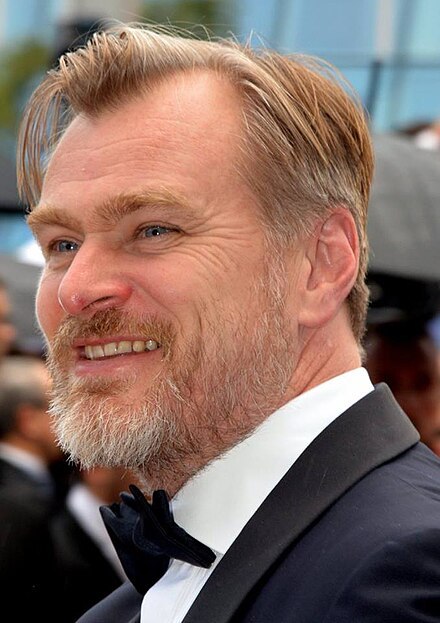
Christopher Nolan (born July 30, 1970, London, England) is a British film director and writer acclaimed for his noirish visual aesthetic and unconventional, often highly conceptual narratives. His notable films include Inception (2010), Interstellar (2014), Dunkirk (2017), and several Batman movies. In 2024 Nolan won an Academy Award for best director for Oppenheimer (2023), which was also named best picture.
(Early Life)
Nolan was raised by an American mother and a British father, and his family spent time in both Chicago and London. As a child, he attended Haileybury, a boarding school just outside London. From a young age Nolan was interested in moviemaking and would use his father’s Super-8 camera to make shorts. He was influenced by George Lucas’s Star Wars trilogy and by the immersive dystopian films of Ridley Scott.After attending University College London, where he studied English literature, Nolan began directing corporate and industrial training videos. At the same time he was working on his first full-length release, Following (1998). The film centers on a writer going to dangerous lengths to find inspiration; it took Nolan 14 months to complete. On the strength of its success on the festival circuit, he and his producer wife, Emma Thomas, moved to Hollywood.
(His Famous Works)
Nolan gained international recognition with his second film, Memento (2000), and transitioned into studio filmmaking with Insomnia (2002). He became a high-profile director with The Dark Knight trilogy (2005–2012), and found further success with The Prestige (2006), Inception (2010), Interstellar (2014), and Dunkirk (2017). After the release of Tenet (2020), Nolan parted ways with longtime distributor Warner Bros. Pictures, and signed with Universal Pictures for the biographical thriller Oppenheimer (2023), which won him Academy Awards for Best Director and Best Picture.
(Filmmaking Style)
His Filmmaking Style
Nolan's films are largely centred in metaphysical themes, exploring the concepts of time, memory and personal identity. His work is characterised by mathematically inspired ideas and images, unconventional narrative structures, materialistic perspectives, and evocative use of music and sound.Joseph Bevan wrote, "His films allow arthouse regulars to enjoy superhero flicks and multiplex crowds to engage with labyrinthine plot conceits. Nolan views himself as "an indie filmmaker working inside the studio system"
(His Filmography)
Nolan made his directorial debut in 1998 with a movie named Following (1998). He made many other films such as Memento in 2000,Insomnia in 2002. He also made the Batman Trilogy which included Bataman Begins (2005),The Dark Knight (2008) and The Dark Knight Rises (2012). In between the Batman Trilogy he directed movies like Prestige (2006) and Inception (2010). After this Nolan directed movies such as Interstellar (2014),Dunkirk (2017),Tenet (2020) and Oppenheimer (2023).
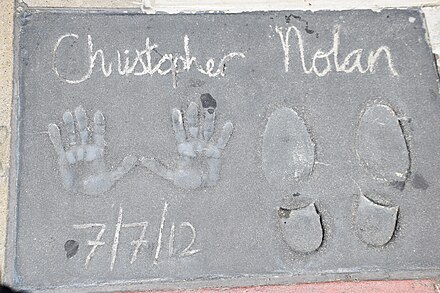
Nolan's hand and shoe prints in front of the Grauman's Chinese Theatre
(Awards & Honors)
Nolan has won 2 Academy Awards out of the 8 nominations, 2 BAFTA's out of the 8 nominations and he has 1 Golden Globe Award out of 6 nominations.
(Sources)
And that's it for this part folks, I'll meet you with another blog about some of the Greatest Directors Cinema has ever seen. Until then
CIAO
6 notes
·
View notes
Text
E.T.: The Extra-Terrestrial
By Carly Leavitt-Hullana
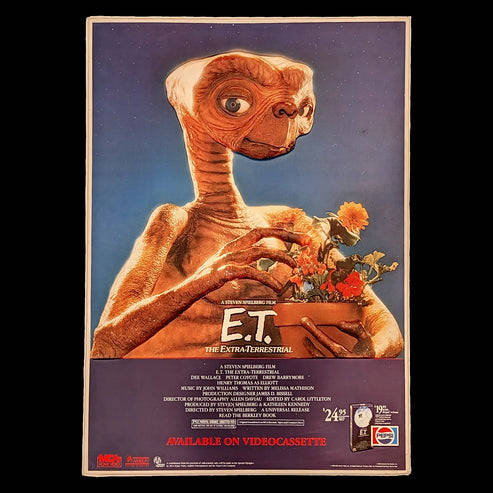
This is an original movie poster for the 3D version, it also advertises the cassette version of the film as well.
E.T.: The Extra-Terrestrial, directed by the infamous Steven Spielberg, was released on June 11th, 1982 by Universal Pictures and Universal Pictures Home Entertainment. The film stars young Henry Thomas as the main character, Elliott, and Drew Barrymore as his younger sister, Gertie. Despite some of the language the children express when no adults are around, the movie is categorized in the family and science fiction genre and is considered to be a classic.
youtube
This is an original trailer that was shown at movie theaters before the desired film was shown to tease the release of E.T. the Extra-Terrestrial.
E.T. follows the story of an extraterrestrial creature who unintentionally gets left behind on Earth and finds Elliott along his adventure to “phone home.” After Elliot takes in E.T. they quickly create a special bond, however, E.T. becomes ill just as fast as they become close. Soon, the government gets involved right in the midst of E.T.’s attempted contact with his family and everything goes south. Although, just like many other family movies, it all works out in the end as E.T.'s people come back for him and he is finally able to go home. One feature that oversees the uniqueness of Spielberg's camera angles. When scenes are from E.T., Elliott, or any kid’s perspective, the camera angles are low or eye-level of a child. On the contrary when adults or a ‘filler’ scene is on screen, the camera angle is standard. See a scene below that utilizes this approach below where Elliott shows Michael and accidentally Gertie, E.T..
youtube
With that being said, it is up to the audience to determine if E.T.: the Extra-Terrestrial is a conventional or unconventional film. There are a few aspects of the film that make it conventional, such as the audience’s ability to easily follow along with the plot and message of the film, the critical obstacle getting solved for a happy ending (a family, heartwarming genre cliche), and the large production budget of $10,500,000. On the other hand, there are a few pieces that could categorize E.T. as an unconventional film, including the children’s language when there is an absence of adults as I have mentioned above, the fact that an alien on Earth breaks social norms, the possibility that the government agents approaching the children with guns can be offensive, and how they portray Elliott’s mother as distraught as she had just gone through a divorce. Regardless, I consider E.T.: The Extra-Terrestrial as conventional due to the factors listed above as well as the film being distributed by a large company and the story and style of the movie is familiar or unoriginal.
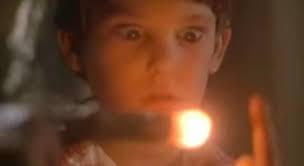
This is the infamous scene where we discover some of E.T.’s special powers as he heals Elliott with his glowing finger.
Speaking of the conventionality of this movie and the large budget of $10,500,000, E.T. performed exceptionally well in the box office. Regardless of the fact that it only profited 2.7% ($11,911,430) of the total gross during opening weekend, it has received $439,454,989 for all time domestic box office revenue, putting E.T. in 29th place on the list respectively (E.T. the Extra-Terrestrial (1982) via THE Numbers). This film has an international revenue of $357,852,418, totaling the worldwide box office profit at $797,307,407 or 75.9 times the production budget. E.T. also has an estimated revenue of $29.367.976 for U.S. DVD sales and an estimated $11,955,717 for U.S. Blu-ray sales. Aside from box office performances, E.T. performed critically well, too. Famous film critics Roger Ebert and Vincent Canby of the New York Times both praised Speilberg for his film. Roger Ebert writes, “That's the sign of a great filmmaker: He only explains what he has to explain, and with a great movie the longer it runs, the less has to be explained.” Ebert is commenting on Speilberg’s writing ability as although it’s a family/children’s movie he created a film that has depth yet the children can understand it without aspects being explicitly explained. Vincent Canby adds, “It's a wise film without being smart-alecky, even if the children, when alone, talk a lot more vulgarly than many parents would be happy to hear.” Aside from some iffy aspects of the film, it’s an overall great movie that is widely enjoyed by children and adults of all ages.
What other popular events occurred in 1982?
Ozzy Osbourne bites the head off of a live bat on stage. Watch Ozzy Osbourne talk about this incident in an interview: Ozzy Osbourne Talking About the Bat Biting Incident via Loudwire.
Argentine Armed Forces surrendered to the British Army at 9:00 PM Falkland Island time on July 14th, ending the Falklands War. Read more about the Falklands War in a National Army Museum article, The British Army and the Falklands War.
2 notes
·
View notes
Note
I wish you weren't still hidden by tumblr both for yourself and so I knew when you reblogged my posts XD
Anyway, I get what you meant in the tags visa V Cinder's backstory coming too late. I confess I feel otherwise, I feel Atlas was the best time for her backstory to be revealed.
Maybe, maybe V6 could work to help set up "Hey Atlas is a horrible place". But there's something about seeing more and more layers of terriblness in real time as the city comes crashing down that works for me.
FFS tumblr free me from this hell I love not being able to reply to things and not having my reblogs show up in notifications
Anyway I think my dissatisfaction with the placement of Cinder's backstory is more a function of RWBY's real-world runtime and release schedule than the in-universe pacing, and by this I mean Cinder's backstory coming out in Volume 8 would bug me far less if I knew nothing of RWBY, began watching it today, and binged it over the next week or whatever instead of waiting 8 real-life years to find out what was going on with the most prominent villain in the series (yes, Salem is the Big Bad, but Cinder has been the antagonist most directly involved with the plot. Until Volume 8, Salem just parked her ass on her throne).
Unfortunately, that's not what happened. We did have to wait 8-ish years for Cinder's backstory, and, as a result, it is demonstrably true that a significant subset of the fanbase simply isn't invested in Cinder anymore. They dislike her, they think she's boring, they're not invested in her anymore, they think it took too long to give her any meaningful depth, they're tired of seeing her on-screen... and honestly, I get it. I like Cinder personally, but I can certainly understand why people would be dissatisfied with her portrayal.
From a narrative perspective, considering what Cinder's backstory is, it makes sense to reveal it when the story travels to Atlas. Your post does a good job of illustrating why, so I won't go over it again. I think personally I'd have partitioned out a few more tidbits in Volumes 4/5/6 just to keep the audience invested, but I'm not sure how to squeeze the bulk of it in earlier without significantly restructuring the post-Beacon aspects of the show.
I think my issues here ultimately stem from RWBY's broader difficulties with matching the scope and complexity of its story to its available resources. RWBY is a very ambitious show and tries to tell a big, spectacular story, but it just doesn't have the runtime to do it effectively. I love the ambition, I really do, but I wish RWBY's showrunners would do a better job of aligning the story they're telling with the resources they have to tell it.
Of course, it's easy for me to say that when I don't have to write under the same constraints they do. I'm not pretending to be an expert on filmmaking or screenwriting, and I don't think what they're doing is as easy as some of the loudest critics seem to think. That said, I really think the show would've been better served by introducing Salem later, given that her presence kind of warps everything around her, but I definitely think the show would've been better served by either cutting out some of the less important characters and storylines (from what I know of what the crew has actually decided to cut, some of the things they chose to prioritize were... interesting) or by hiring more people, paying and treating them properly, and improving the production process so that they could actually tell a story that had the scope they want.
15 notes
·
View notes
Text
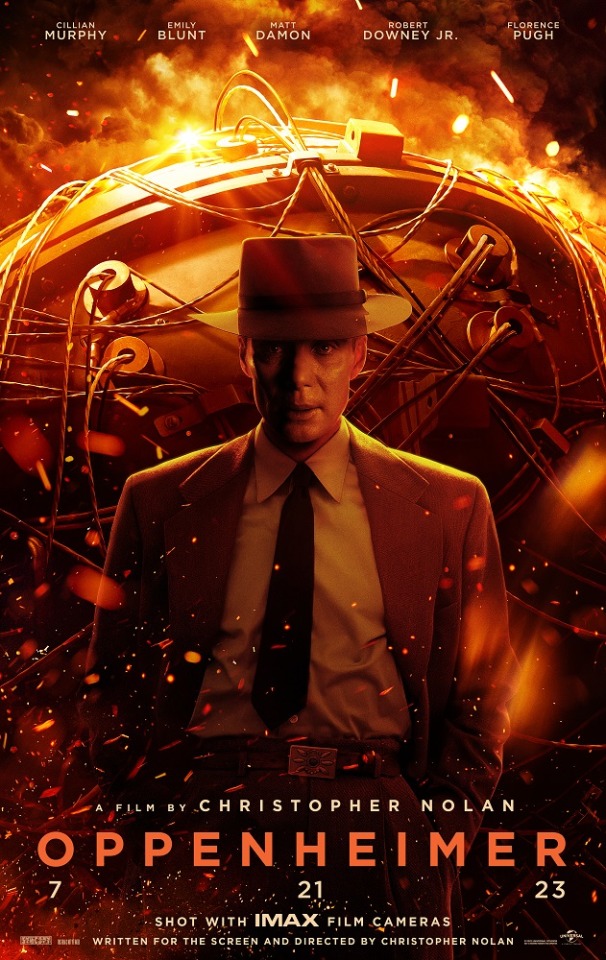
OPPENHEIMER (2023)
Starring Cillian Murphy, Emily Blunt, Matt Damon, Robert Downey Jr., Florence Pugh, Josh Hartnett, Casey Affleck, Rami Malek, Kenneth Branagh, Benny Safdie, Dylan Arnold, Gustaf Skarsgård, David Krumholtz, Matthew Modine, David Dastmalchian, Tom Conti, Michael Angarano, Jack Quaid, Josh Peck, Olivia Thirlby, Dane DeHaan, Danny Deferrari, Alden Ehrenreich, Jefferson Hall, Jason Clarke, James D'Arcy, Tony Goldwyn, Devon Bostick, Alex Wolff, Scott Grimes, Josh Zuckerman, Matthias Schweighöfer, Christopher Denham, David Rysdahl, Guy Burnet, Louise Lombard, Harrison Gilbertson, Emma Dumont, Trond Fausa Aurvåg, Olli Haaskivi, Gary Oldman, John Gowans, Kurt Koehler, Macon Blair, Harry Groener, Jack Cutmore-Scott, James Remar, Gregory Jbara, Tim DeKay and James Urbaniak.
Screenplay by Christopher Nolan.
Directed by Christopher Nolan.
Distributed by Universal Pictures. 180 minutes. Rated R.
J. Robert Oppenheimer was certainly one of the more complex men – with one of the more complex legacies – in modern history.
He was a scientist who believed in the sanctity of life, and yet his greatest discovery is forever linked to massive death. He was called both a war hawk and a communist, but in this film, he refers to himself as a New Deal Democrat. He created the most awesome weapon in American history (at the time), but he apparently sincerely hoped the specter of nuclear Armageddon would stop people from using it.
His invention of the atomic bomb certainly put an exclamation point on the end of World War II, and yet as Oppenheimer points out, it may not have even been necessary. Hitler was dead, Germany had fallen, and the Japanese were teetering. Chances are good they would have surrendered even without having two of their cities annihilated. (Oppenheimer actually tried to talk Harry S. Truman out of using the bomb on Japan, feeling that just the knowledge that it was there may be enough of a deterrent.) He spent much of his later life trying to protest the use of his greatest achievement.
He was a loving, doting husband and also a total womanizer. He was a good friend and at the same time he was rather self-involved. He became a scientific celebrity, but he was an intensely private man who rather hated the spotlight. He was a mostly non-political man who became entangled in several political morasses. He had passionately held beliefs, but he often was unwilling to fight the injustices going on around him, simply hoping against hope that the people on the other side would come to their senses. And he always overestimated the intrinsic good in people.
It perhaps makes a certain amount of sense that the film about Oppenheimer’s life would be helmed by Christopher Nolan, a similarly complex character. Nolan is a brilliant filmmaker (The Dark Knight, Inception, Memento), but not always all that good as a storyteller (Interstellar, Tenet, Batman Begins).
Well, with Oppenheimer, Nolan has one hell of a story to tell. It’s smart, thought-provoking, tragic, and intensely timely even decades after the action took place. And even though the film runs a little bit long (three hours!) and has occasional slow patches, it is quite probably Nolan’s best film.
Based on the Pulitzer Prize–winning 2005 biography American Prometheus by Kai Bird and Martin Sherwin, Oppenheimer takes a measured, scientist’s perspective to the life and times of a flawed but basically brilliant man. From his youth in university, through the Manhattan Project and his later time as an advocate against nuclear proliferation, Oppenheimer flips back and forth through the years and history, putting a microscope on a man who probably never totally wanted the scrutiny.
Framed around an attempted political takedown of the scientist in his later years, Oppenheimer is both a courtroom drama and a truly inspired celebration of science, both its good and bad aspects.
Along those lines, know going in that Oppenheimer is not going to dumb things down for mass consumption. It is often talky and takes on complicated scientific and philosophical concepts and respects the audience enough to assume that they will be able to keep up.
Oppenheimer is a thoughtful, intelligent and gorgeously shot snapshot of our recent history. Do not be surprised to see a lot of this film on Oscar night next year.
Jay S. Jacobs
Copyright ©2023 PopEntertainment.com. All rights reserved. Posted: July 21, 2023.
youtube
6 notes
·
View notes
Note
Question for Miles is a moron, what do you think the throat spray actually was? Do you think he actually thought it was covid protection? Do you think he knew it was nothing and just used his image to lie to his friends to get what he wanted?
GREAT fuckin question. i havent thought on it too much since id mostly seen it from the filmmaking perspective of acknowledging covid in-universe without the everything that came with early covid and no vaccines yet but now u have me thinking.
(this got so long so im gonna put it under the cut oops)
first i wanna say im really mostly talking out of my ass since that scene was the last concrete point abt covid we really have outside of mentions like why miles has the mona lisa lmaooo anyway:
like i said miles really is a moron. everything he takes credit for he either hires someone for, steals their work, or lets them interpret his bullshit (like lionel w the faxes). so i think theres a couple possibilities.
he almost definitely went to someone to develop the throat spray, and its possible he actually asked or expected it to be Real and actually protective. but it being so early in the pandemic and over a year before the irl vaccine wld come out they probably told him its not possible. and theres the point where he could have done a couple things.
he could have 1) pushed whoever to just make it work like we see so many bosses and rich assholes like to do and it IS actually protective [very unlikely but we REALLY dont know much about what happens after the movie covid wise and how far rian johnson changes reality here]
b) done the above and whoever he hired lies to him and says it works when it doesnt, and he believes it works like you mentioned [more likely, but thats putting a moral decision on a person i made up two paragraphs ago lol]
iii) they told him it wasnt possible and he just told them to make a placebo instead and knows its fake like you said, using his image as a genius to manipulate his friends [most likely in my opinion, given everything else he does]
i really do think the last one is what happened. the efficient man doesnt answer blanc's question about what the spray is. all he does is say “youre good,” put the little slap bracelet on blanc, and move on. and we dont know much of miles' actual opinions on masks and covid iirc, besides being friends with both ppl like lionel who properly masks up and asks for elbows instead of a hug from birdie, and with duke who doesnt wear one at all and is. ukno. him. so theres that
all of this to say. miles bron really is just an entitled asshole who thinks he makes change when he doesnt and doesnt care abt consequences. i personally think he actively knows the spray didnt do shit but couldnt stand the idea of going a year without getting his ego stroked by those shitheads and would do anything he “could” to make it happen. this is also the same guy who just sent the 50 people it takes to run the island “home” in the middle of the pandemic which has implications about commuting and pods i dont even want to go NEAR since this is already too long.
tldr: hes a moron AND a manipulating and gaslighting bitch. the spray was probably just saline or whatever and he knew it. shithead
#ask#I AM SO SORRY I WENT ON FOR SO LONG#category 5 autism event#also the 1/b/iii thing is on purpose i love mixing numbering systems lol#also apologies to anyone who sees this in the main tag i gotta do it for personal categorizing purposes#not really supposed to be a big proper analysis mostly just me vibing#glass onion#asks#hook-on-fandoms
14 notes
·
View notes
Text
Soviet union films that you should check out
Sayat Nova (The Color of Pomegranates)
The title refers to the Armenian 18th century poet named "Sayat Nova". The film was directed by the Georgian filmmaker Sergeï Parajanov in 1968. Parajanov started working on this film due to the complications on another project called Kiev Frescos — from which remain only fourteen minutes left today. Sayat Nova was shot in Armenia, which was Parajanov’s ancestors homeland. Parajanov started working on this film because he was a great lover of religious icons. This passion came directly from his father, who was himself an antique dealer. This film is therefore in a way a tribute from a son to his father, in the way he shows that it is necessary to save art.
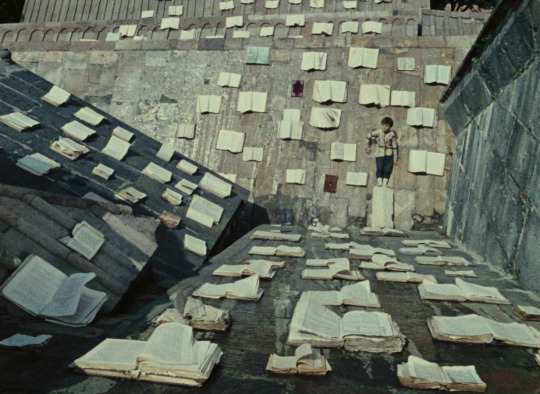
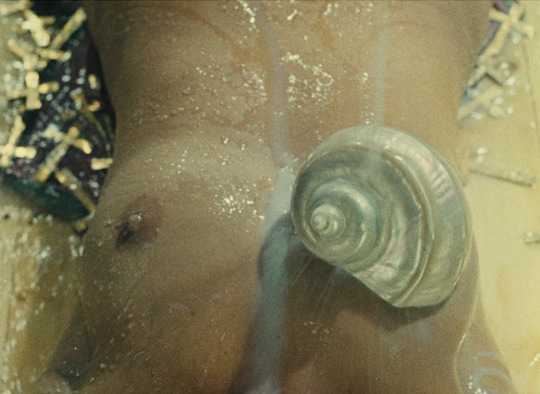
The film is divided into eight chapters : "Childhood", "Youth", "Prince's Court", "The Monastery", "The Dream", "Old Age", "The Angel of Death" and "Death". The film follows the course of the life of the poet, from the cradle to the grave. What is interesting about this film is that it tells the story of a poet's life, in the manner of a poem. Rarely quoting Sayat Nova's poems, Parajanov manages to shape a visual language that tends to recreate the experience of reading poetry. The visual universe of the film is very singular because it borrows a lot from theater. Indeed, all the shots are still, and organized as tableaux. Moreover, the main actress, Sofiko Chiaureli plays 6 roles, both male and female. So that you have the feeling of seeing the same face during the entirety of the film. As a funny parallel, Sergeï Parajanov writes, directs, edits, choreographs, and designs both sets and costumes of the film. All these parallels are indeed a way to produce visual rhymes, to remind us that this film is about Sayat Nova's poetic work

Beyond the symbols and idiosyncrasies, the film is striking for its intense aesthetic beauty and its sense of detail, particularly through its collage of materials and textures. The idea behind this project is to revive the power of a primitive cinema that focuses above all on the image, and that questions the viewer's relationship to images. Sayat Nova revives an idea of the image that one might have had in the Middle Ages: this flatness of perspective and relief; this palette of colors without artifice; these strange, unrealistic choices to play out action, symbolism and time on the same immobile plane, embodied in an old-fashioned plasticity. And yet, Parajanov does not make a picture-film: he plays with sounds, with cyclical, and almost atemporal gestures.
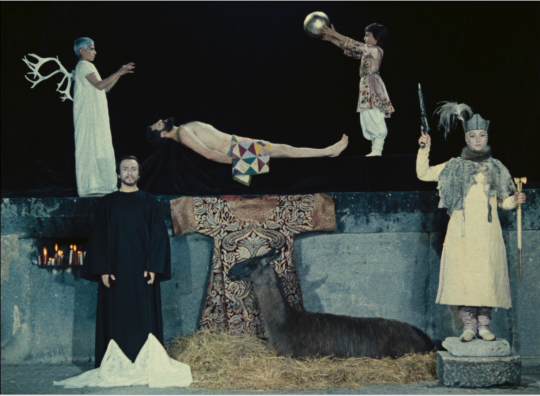
"In the temple of cinema there are images, light and reality. Sergeï Parajanov was the master of that temple." - Jean-Luc Godard.
Obviously, when the film was presented to the Soviet authorities, it was immediately attacked since it showed no class struggle or critical awareness of social reality and that it was instead, steeped in a suspicious fascination with a past feudal era. Most of the critics said that film was "completely unintelligible" and harmful to working-class art because it showed a bourgeois formalism. Paradjanov was then forced to accept that a purified version of his film be made. It was this shortened version, under the title Sayat-Nova - The Colour of Pomegranates, which was shown in cinemas.
Link to watch the film : https://youtu.be/KLZ4GSxP9eo
J.A. Lenourichel
3 notes
·
View notes
Text
Unveiling the Cinematic Tapestry: The Profound Impact of Film on the World
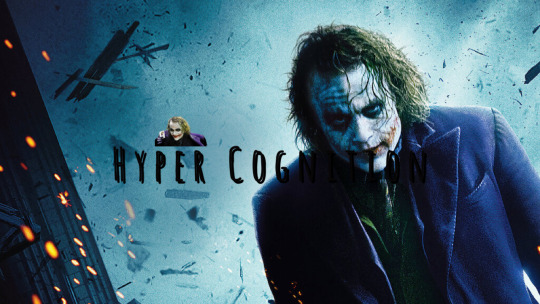
In the vast realm of artistic expression, few mediums possess the ability to captivate and transcend boundaries like the world of cinema. Film, a masterful amalgamation of visual storytelling, soundscapes, and compelling narratives, has woven itself into the very fabric of human existence. From the silent classics of the early 20th century to the awe-inspiring blockbusters of today, cinema has emerged as a powerful vehicle for both entertainment and reflection, profoundly impacting our lives and shaping the world we inhabit.
The Magic of Escapism:
Film, at its core, offers a respite from the complexities and mundanities of everyday life. It transports audiences to alternate realities, inviting them to suspend disbelief and immerse themselves in a myriad of emotions. Whether through tales of epic adventures, heart-wrenching dramas, or uproarious comedies, cinema allows us to escape the confines of our existence and experience moments of joy, sorrow, and everything in between. In this capacity, films serve as a refuge, providing solace and inspiration during challenging times.
The Mirror of Social Commentary:
Beyond its enchanting escapism, cinema functions as a potent mirror, reflecting the collective consciousness of society. Movies have the remarkable ability to shed light on social issues, expose injustices, and challenge prevailing norms. Through thought-provoking narratives and vivid character portrayals, films become a catalyst for discussions on topics ranging from politics and culture to gender and identity. They give voice to the marginalized, expose the flaws of our systems, and compel us to introspect, ultimately inspiring positive change.
The Universal Language:
One of the most remarkable aspects of film is its universal language, transcending barriers of nationality, culture, and language. Stories unfold on the silver screen, devoid of linguistic constraints, relying instead on the power of visual and auditory cues to communicate and connect with viewers across the globe. The emotions evoked, the messages conveyed, and the human experiences portrayed resonate with audiences irrespective of their background, forging a profound sense of shared humanity.
The Cultural Zeitgeist:
Films, like time capsules, encapsulate the spirit of their era, preserving and immortalizing the cultural landscape of a particular time. They become touchstones for future generations, offering glimpses into the beliefs, values, and aspirations of bygone eras. From the rebellious counterculture of the 1960s to the technological marvels of the 21st century, movies stand as cultural artifacts that help us comprehend the essence of different epochs, fostering a sense of historical continuity and contextual understanding.
The Power to Inspire:
Film possesses an inherent power to inspire individuals and shape their perspectives. It has the ability to ignite imagination, foster empathy, and kindle a sense of wonder within us. Countless filmmakers and actors have become beacons of creativity, inspiring generations with their visionary storytelling and indelible performances. The impact of a single film can ripple through society, sparking movements, influencing popular culture, and leaving an indelible mark on the world.
Conclusion:
The meaning of film in the world transcends entertainment; it extends to our very core as human beings. It serves as a vessel for our dreams, fears, and aspirations, giving them life and bringing them to the forefront of collective consciousness. Film both reflects and shapes society, providing a mirror through which we examine ourselves and a window through which we glimpse other worlds. In its profound ability to inspire, educate, and unite, cinema stands as a testament to the boundless power of human creativity and the enduring impact of storytelling.
2 notes
·
View notes
Text
An intro to something completely different;
Sorry about the 3 month delay between this and the last post. You'll find out soon that this isn't strictly a write-up about video games but I have been working on another one about an actual game which should be done a couple days from this. Anyway,
Video game movies have always been pretty interesting to me from the perspective of someone that really likes both mediums, more notably the way games are portrayed in an art form that's far more established and with a longer line of prestige and cultural importance.
I've always subconsciously thought of it as a kind of older and younger brother dynamic but regardless, the ones that fall more into the younger camp have mostly known about this for years and it definitely results in a lot of complicated feelings about how worthwhile the medium actually is.
But despite Roger Ebert famously being an old coot about the whole thing alongside several others, movies have kinda not been able to help revolve every occasional decently budgeted story about the New Thing that's evidently causing a lot of commotion and as will become definitely more obvious down the road, very profitable for better or worse.
I've had this project in the back of my mind for 4 months and I figured now was as good a time as any to get it actually in full gear so without further ado;
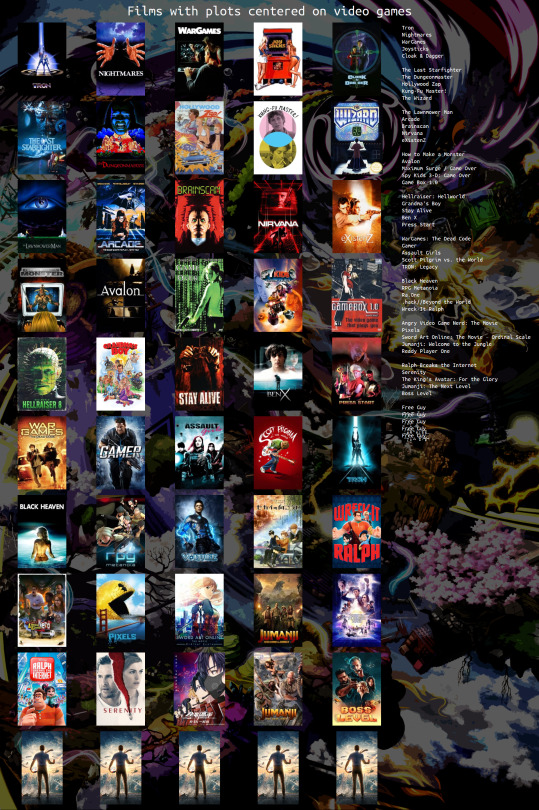
Sorted by release date, these are all the video game movies Wikipedia cites as "centered on video games", a couple of more were added since I compiled this but I figured letting Free Guy be the "final boss" of this project would be fitting. It'll almost certainly be the toughest on me mentally but we'll get there.
I'll go through all of these alongside my typical game coverage, but these aren't going to just be film reviews, my goal is to primarily examine how filmmakers interpret and use video games in their own work, which is why I'm not doing movies based on video games (way too many to count and most are just their own kind of film as opposed to anything about video games).
I've only seen 7/46 of these so far, you'll figure out which when we get to them.
With all that out of the way, let's kick things off with...
Tron (1982)
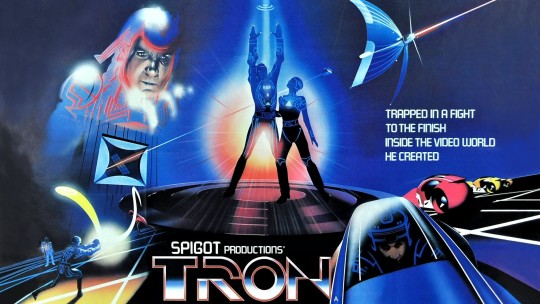
I was honestly pretty surprised to find out this was what's apparently the catalyst of video game movies but by all accounts, it's far better than what I had expected. Double surprising too seeing how mixed everyone else seems on it despite being so famous.
The premise is actually relatively typical for an 80s adventure movie but it's layered underneath a lot of jargon that doesn't seem to even make much internal sense.
It's all stuff that'll generally sound like it makes enough sense on its own until you think about it for even a minute but it's bold as hell to put this much trust in the audience to know that it all ultimately doesn't matter and it's just in service to the story and aesthetic.
And the aesthetic is like, wew. It is a genuine marvel to look at and absolutely not even cuz of the CG. All the actors seem to have been greenscreened and then have their frames waterpainted over and it makes for a super interesting effect.
It's obviously not flawless and there are clear artifacts from this process but it does also result in everyone having this slight sort of shakiness which made the whole world feel a lot more unstable which is cool cuz everyone is literally just a program.
The visuals in general feel so much more ahead of the curve than they have any right to, everything's illuminated and highlighted with LEDs. Even obvious tricks like reflective water have so much bloom that you forget it's literally just water, straight up I don't know why Razer doesn't adapt to this kind of aesthetic wholesale instead of the sometimes ugly bloomy lights they tend to go for.
All that alongside the slightly bit-crushed and reverbed audio design makes for a data-driven universe that's as dreamy as it is alien, which considering the kind of cultures and interests the internet cultivated, which this also kinda predicted in its own way.
The downtimes really showcase The Grid's cold vastness, even the action scenes don't get that bombastic all things considered.
The video game stuff itself is a lot closer to something tangibly real than I expected too, the motorcycle races are contextualized as competitive multiplayer Snake and the other games are also, kinda silly but it's not impossible to picture them as their own VR esports, in this case being algorithmically perfected by various AI vessels, as you do.
Anyway, this project's off to a shockingly stellar start.
Things will definitely vary in terms of quality from here on out but this far exceeded expectations. A good kick-off to what is definitely gonna get worse down the road, but hey, we're pretty far from that still. We can bask in the goodness of genuinely enthusiastic video game movies before formulas had become perfected and took genuine risks.
Still, Tron happened a year before the game crash so things are probably gonna look fairly different from this point on, but that's alright. We're still in the experimental era, anything's possible.
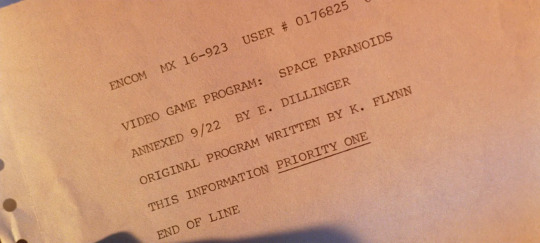
3 notes
·
View notes
Text
Sessão Mutual Films: Nascimento e origem: Os enganados + Diálogo árabe israelense [Mutual Films Session: The Dupes + Arab Israeli Dialogue]
May 14: The link above leads to Portuguese-language information about the 23rd edition of the Mutual Films Session, co-curated and organized by me and Mariana Shellard, whose screenings will take place on May 15th and 26th at the São Paulo-based unit of the Instituto Moreira Salles (IMS) and on May 19th at the Instituto’s unit in Poços de Caldas.
The event places into dialogue two restored films from the early 1970s. The undervalued Egyptian director Tewfik Saleh’s Syrian production The Dupes, from 1972, is today considered a classic work of Arab fiction filmmaking, including in its inspired and instigating relation to its source material, the Palestinian author and activist Ghassan Kanafani’s debut novel Men in the Sun. The American filmmaker and activist Lionel Rogosin’s last film, a medium-length documentary from 1974 called Arab Israeli Dialogue, has gone in recent years from relative obscurity to ever-greater circulation as the issues discussed in the film's central conversation between the Israeli journalist and playwright Amos Kenan and the Palestinian poet Rashed Hussein have come to seem increasingly relevant. (The film’s legacy is discussed in greater detail in a recent feature-length documentary directed by Michael Rogosin – one of Lionel’s two sons – called Imagine Peace.)
Both films were recently digitally restored by the Cineteca di Bologna. The Cineteca and World Cinema Project’s restoration of The Dupes utilized as its primary source materials a duplicate 35mm negative (located in the Bulgarian National Film Archive) and the original sound negatives (housed with Éclair Classics, in France), while the Cineteca and Rogosin Heritage’s restoration of Arab Israeli Dialogue utilized the film’s original 16mm materials (which have been preserved by Anthology Film Archives, in New York).
The screenings at IMS of Arab Israeli Dialogue will have free admission. The screening of The Dupes in São Paulo on May 15th will be followed by a public conversation between me, Mariana, and Arlene Clemesha – an author, translator, film curator, and professor of Arab History and Culture at the University of São Paulo.
It is inevitable that the screenings of these films will raise connections to present-day events. With this said, we prefer not to make claims about what those connections might be. It interests us more to invite viewers to observe conversations that people were having half a century ago and consider for themselves how those conversations have changed over time.
To this end, we have included three supplemental items on our website, in addition to our synopses and curatorial text. One is a translation of part of an interview that Saleh gave about The Dupes in 1976, four years after the film’s world premiere; one is a translation of material from a conversation held in 1990 between Lionel Rogosin and Amos Kenan about issues salient to Arab Israeli Dialogue (a recording of which appears on the film's North American DVD release); and one is a translation of a poem called “With the Land”, written by Rashed Hussein.
I have found myself often thinking in recent times about how my preferred literary critics right now are Edward Said and Marjorie Perloff, both of whom argued at various times for the importance of valuing a multiplicity of perspectives and voices. It is true, of course, that some things are much bigger than cinema, as well as art in general, but the perspectives of artists on them will always be vital.
1 note
·
View note
Text
Blog #5

Hideo Nakata’s "Ringu" (1998) emerges as a chilling tale rooted in the realm of urban legend, Nakata's masterful direction plunges audiences into a realm of existential dread, where technology and ancient superstitions collide in a spine-tingling narrative that transcends cultural boundaries. "Ringu" not only captivates with its eerie storyline and iconic imagery but also serves as a catalyst for the evolution of Japanese horror cinema, influencing filmmakers worldwide and sparking a global fascination with its uncanny tale. Through an analysis of critical perspectives and cultural impact, this essay delves into the enduring legacy of "Ringu" and its profound influence on the horror genre, both in Japan and beyond.
youtube
Hideo Nakata’s Ringu (1998) begins as a rumor that is going around amongst Tokyo’s teenagers. Stating that there is a cursed videotape that will kill you if you watch it. So, when a high school student name Tomoko and her friends die mysteriously, her aunt Reiko investigates her niece’s death.
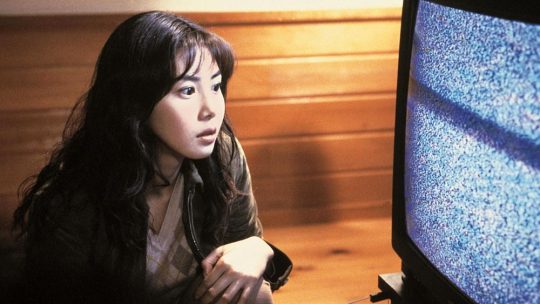
youtube
Reiko’s search leads her to the cabin which her niece originally watched the cursed videotape, Reiko ends up watching the video which features rando, bizarre images. After she views this disturbing video, she sees an apparition on a girl dressed in white with long black hair and receives an ominous phone call. After this Reiko is convinced that she now shares the same fate as her niece, she employs the help of her ex-husband Ryuji who has psychic abilities and when their son Yoichi accidentally sees a copy of the tape the two work together to figure out how to save themselves and their son from this.
In Emily Nighman’s review of Ringu (1998) for The Film Magazine she states “The film may lack the genre’s characteristic jump scares, gory monsters, and epic fight scenes. But its timeless terror stems from its basis in reality and, therefore, our inability to distance ourselves from it. It plays on age-old fears of the paranormal while tapping into modern phobias of self-aware technology that we don’t fully understand. This tension makes the film a horror classic that stands the test of time.” Nighman claims that the film’s unique twist on the technology versus old ways trope is what makes the film so powerful. Hideo Nakata takes tried and true tropes and applies them to Ringu (1998), keeping these intense and memorable storylines while also paving the way for future horror films. Nighman claims that the fear within Ringu (1998) also lies within the fact that the story is not completely made believe and that “the story of Sadako’s mother, Shizuko, is based on a true story. The director explains that a woman named Mifune Chizuko once claimed to be psychic and, while being studied by a professor at Tokyo University, was eventually discredited and took her own life. With this knowledge, viewers may feel that the tape’s origin story is even more realistic and terrifying.” Nighman’s revels in the fact Ringu (1998)’s incredible uniqueness will be the reason that the film stands the test of time in the film industry.
In Jessica Balanzategui’s book called “The Uncanny Child in Transnational Cinema: Ghosts of Futurity at the Turn of the Twenty-First Century”, section three titled “Our fear has taken on a life of it’s own: the uncanny child in Japanese Horror Film”, she discusses how “the boom of child centered ‘J- horror’ cinema around the millennial turn as an expression of widespread cultural anxieties that national progress was coming undone”, seemingly critiquing how in Nakata’s film, which has risen to become one of Japan’s most commercially successful film product, “ignited a transcultural obsession with the uncanny child” (Balanzategui 155).
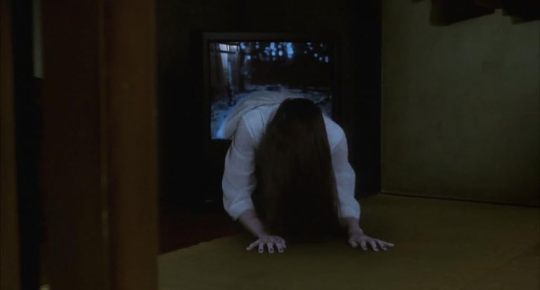
They go on to discuss how using Sadako as a beacon for the old ways coming to haunt new advancements within society “Sadako, the terrible aggressor of Ringu, has become the most recognizable horror icon of the new century: a strange but telling paradigm for this moment of global transition, considering that she functions as a harbinger for the collapse of chronological progress” (Balanzategui 156). In a separate chapter of the novel titled “Trauma’s Child: The uncanny child in transnational coproductions and remarks” she goes on to further critique the use of children as the main antagonist within these film which was spearheaded by Nakata and his film “Ringu” (1998) stating “subsequent to the global popularity of the Ring and Ju-on franchises, the child-focused J-horror cycle came to change the shape of the horror genre globally” (Balanzategui 221).
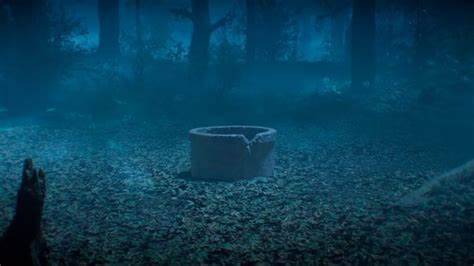
Like previously mentioned with Jessica Balanzategui, Ringu (1998) has became a global phenomenon, inspiring countless sequels and even an American and Korean remake. Sara Clyndes discusses whether or not Ringu (1998) has genuinely made a difference within both the Japanese and American/Western film industry within her essay “Has ‘Ringu’ (1998) changed both Japanese and American/Western cinema and if so, how?” Clyndes states that personally she does not think that Ringu (1998) has made a significant impact on western horror films of the past decade and that “Although DVD sales of the film increased as the remake gave it a higher profile, it was still quite an alien film in the west and remained so before it was remade in 2002”. She goes onto to say that Japanese films are well known for reflecting the socioeconomic and political anxieties surround the nation at the time, and that this makes it hard for Japanese films to resonate with a Western audience. Giving the example that “With current social anxieties and fears being the backbone of many Japanese films perhaps these films wouldn’t translate well in the west which could prove why there don’t seem to be any western horrors which draw from eastern sources”. Clyndes moves onto state that for Eastern films to do well within the Western box office that would have to westernize their films, loosing the entire essence of Japanese cinema as a whole.
youtube
In conclusion, "Ringu" (1998) stands as a seminal work in Japanese horror cinema, weaving a tale of dread and despair that continues to resonate with audiences worldwide. Emily Nighman's review for The Film Magazine highlights the film's ability to tap into age-old fears while addressing modern anxieties about technology, cementing its status as a timeless classic. Furthermore, Jessica Balanzategui's analysis sheds light on the cultural significance of "Ringu," particularly in its portrayal of the uncanny child as a symbol of societal upheaval and impending collapse. Despite its global success, Sara Clyndes raises questions about the film's impact on Western cinema, suggesting that cultural differences may hinder its reception outside of Japan. Ultimately, "Ringu" remains a haunting reminder of the power of storytelling to evoke fear and fascination across borders and generations, leaving an indelible mark on the world of horror cinema.
Ringu (1998) J-Horror Review | The Film Magazine (thefilmagazine.com)
Ringu (1998) - IMDb
"Has ‘Ringu’ (1998) changed both Japanese and American/western cinema and if so, how?" by Sara Clyndes: Part One | Horror Cult Films
Midnight Eye feature: The Death of J-Horror?
Our Fear Has Taken on a Life of Its Own: The Uncanny Child in Japanese Horror Film. (n.d.). In The Uncanny Child in Transnational Cinema (pp. 156–178). Amsterdam University Press.
Trauma’s Child: The Uncanny Child in Transnational Coproductions and Remakes. (n.d.). In The Uncanny Child in Transnational Cinema (pp. 219–236). Amsterdam University Press.
0 notes
Text
Jake Seal Black Hangar Studios Strategies for Achieving Film Success in Hollywood
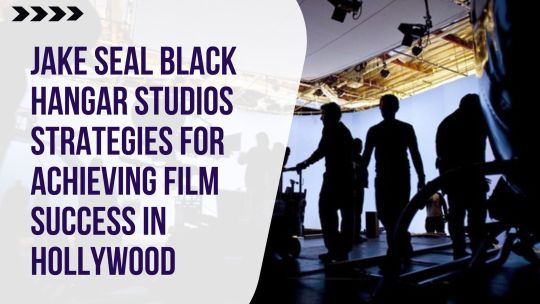
In the bustling world of Hollywood, where dreams are both made and shattered, navigating the terrain of the film industry requires more than just talent and luck. It demands a strategic approach, a meticulous plan crafted to defy the odds and carve out a path to success on the silver screen. While the journey to cinematic acclaim may seem daunting, there are guiding lights and visionaries who illuminate the way with their proven strategies. Here, we delve into the insightful strategies employed by a renowned figure in the industry, shedding light on the roadmap to film success in Hollywood.
Crafting Compelling Narratives
At the core of every successful film lies a captivating narrative that resonates with audiences on a profound level. In an era inundated with content, storytelling reigns supreme, serving as the cornerstone of cinematic achievement. According To Jake Seal Black Hangar Studios, From the initial concept to the final cut, crafting compelling narratives is a labor of love that demands creativity, authenticity, and emotional depth. By tapping into universal themes and human experiences, filmmakers can forge connections that transcend boundaries, leaving a lasting impact on viewers long after the credits roll.
Embracing Innovation
In a landscape characterized by rapid technological advancements, innovation is key to staying ahead of the curve in Hollywood. From cutting-edge visual effects to groundbreaking production techniques, embracing innovation opens doors to new possibilities and elevates the cinematic experience to unprecedented heights. According To Jake Seal Black Hangar Studios, By harnessing the power of emerging technologies and pushing the boundaries of conventional filmmaking, visionary filmmakers can captivate audiences with immersive storytelling that pushes the boundaries of imagination.
Cultivating Collaborative Partnerships
In an industry fueled by collaboration, forging strong partnerships is essential to navigating the complexities of Hollywood. From assembling a talented cast and crew to securing financing and distribution deals, success often hinges on the strength of collaborative relationships. By fostering an environment of trust, mutual respect, and shared vision, filmmakers can harness the collective creativity of their team to bring their cinematic vision to life. According To Jake Seal Black Hangar Studios, Whether collaborating with seasoned industry veterans or nurturing emerging talent, cultivating meaningful partnerships is a cornerstone of success in the world of filmmaking.
Navigating Industry Dynamics
Beyond creative prowess, navigating the intricacies of the industry landscape is crucial to achieving film success in Hollywood. From navigating the festival circuit to securing coveted distribution deals, understanding the nuances of industry dynamics is essential to positioning a film for success. By staying abreast of market trends, forging strategic alliances, and leveraging industry connections, filmmakers can maximize opportunities and overcome obstacles to cinematic acclaim.
Cultivating a Global Audience
In an increasingly interconnected world, the ability to resonate with diverse audiences across the globe is paramount to achieving film success in Hollywood. By embracing cultural diversity and celebrating unique perspectives, filmmakers can create stories that transcend borders and resonate with audiences from all walks of life. Whether through nuanced storytelling, authentic representation, or strategic marketing initiatives, cultivating a global audience requires a deep understanding of cultural dynamics and a commitment to inclusivity and representation.
In Conclusion
As aspiring filmmakers embark on their journey to Hollywood, armed with passion, talent, and a burning desire to share their stories with the world, the strategies employed by industry luminaries serve as guiding beacons, illuminating the path to cinematic success. By crafting compelling narratives, embracing innovation, cultivating collaborative partnerships, navigating industry dynamics, and cultivating a global audience, filmmakers can chart a course for cinematic achievement in the ever-evolving landscape of Hollywood. With perseverance, creativity, and a steadfast commitment to excellence, the possibilities are limitless, and the journey ahead is boundless.
0 notes